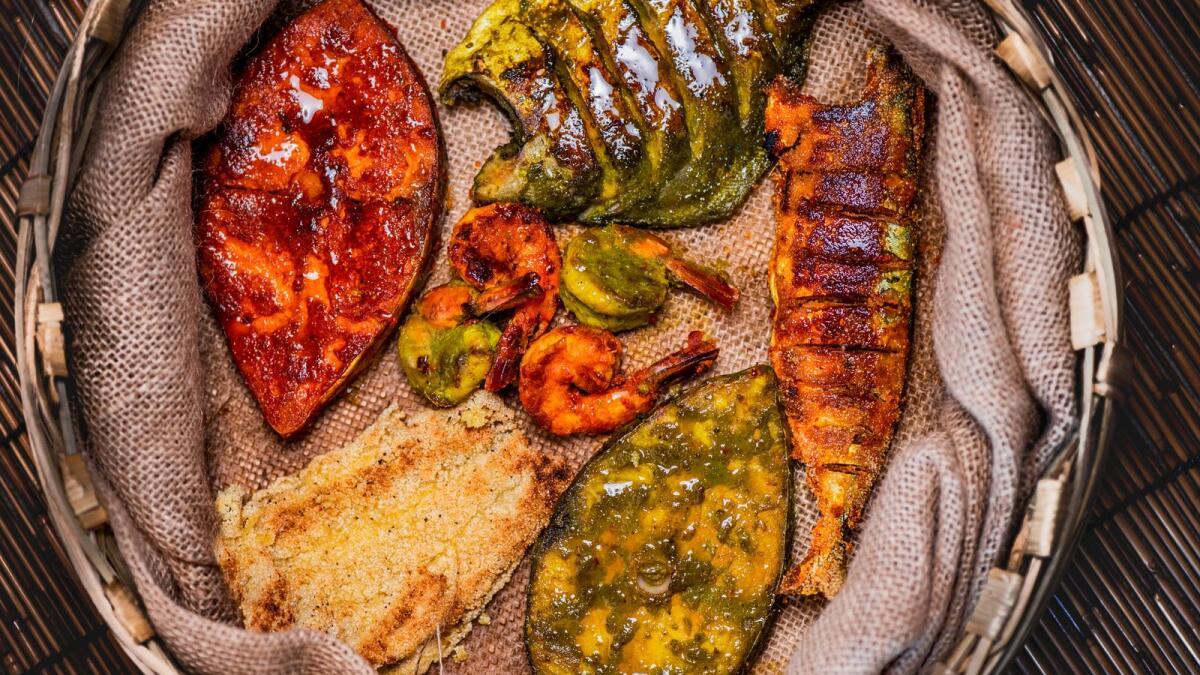
UAE: Meet The Sharjah Sheikh Who Traces Your Fish From Sea To Plate
Last updated: Tue 2 Jul 2024, 7:02 AM
Do you know where your seafood comes from? Tracing the route and knowing details about how, when, and where your fish was caught and processed thereafter is important, says an Emirati entrepreneur, fondly called the 'Turtle Sheikh'.
“The precursor to sustainability is traceability because you can't improve what you can't measure,” said Sheikh Fahim Al Qasimi, the co-founder and chief impact officer of Seafood Souq – a digital ecosystem for global seafood trade and traceability.
Stay up to date with the latest news. Follow KT on WhatsApp Channels.
In an interview with Khaleej Times, Sheikh Fahim highlighted the need for transparency in the seafood supply chain.
Sheikh Fahim Al Qassimi
“Unfortunately, seafood supply chains are very opaque. Our view for sustainability is if we want to protect marine biodiversity as consumers and as the seafood industry, we need to be more transparent and traceable. So, our company builds traceability tools for fisheries, processors, distributors, hotels, supermarkets, and restaurants, to help shed light and be more transparent on where their seafood is coming from. It not only allows us to be better stewards of our ocean environment but also allows consumers to protect their choices,” he said.
Sheikh Fahim noted that Atlantis, Dubai, is using Seafood Souq's tech solutions to trace where they're getting their seafood from, protecting consumers and ensuring sustainable sourcing of seafood.
The SFS Trace – the software solution provides insights like quality, freshness, and source, through data tracked at every stage of the supply chain, i.e., covering a journey from sea to plate.
Developing fisheriesSheikh Fahim, known for rescuing injured sea turtles, hopes to digitise the UAE seafood economy.“We have about 6,000 fishing boats in the UAE. We want to give them the tools to increase the value of local catch, protect a brand of UAE local caught seafood, and then have that find its way into our markets and our hotels and restaurants,” he said at the annual Global Sustainability Forum in Abu Dhabi.
Sheikh Fahim noted his Emirati company is one of the five firms in the world to operate on a protocol or a shared framework called the Global Dialogue on Seafood Traceability.
“It is being adopted by the US in 2026 as a mandatory requirement for all seafood imported into the US. We build technology tools that allow small-scale fisheries, coastal communities as well as big commercial vessels, to use these tools and allow them to collect the right data, accurately, verify it, and then provide it in the supply chains.”
To date, Seafood Souq has digitised about 65 per cent of South Africa's Pole and Line Tuna fisheries.“The first digitisation of fisheries we did was in South Africa. Now we hope to roll that out across all seven emirates of the UAE, hopefully across the region. We have done some work in Oman,” he said and noted having discussions with the Maldives, and Costa Rica.
“We look forward to continue building our technology with a full understanding of what the leadership of this country is looking for, which is developing technology solutions and exporting them across the world.”
Three-fold benefitsThe tech solution leads to economic, social and environmental benefits, Sheikh Fahim underlined.“It will increase the value of the products by ensuring traceability, reducing wastage along the supply chains, and providing more income for the fishermen.”
According to UK-based think tank Planet Tracker, better traceability could boost global seafood profits by 60 per cent.
“On the social side, like every country in the world, our fishing populations are extremely important to us, culturally, historically, and in the UAE, they value seafood economy at about Dh1.8 billion.
“On the environmental side, we need to be good stewards of the oceans. Fish is the only food that we eat, that we extract from the earth. Though fish farming exists, a lot of the seafood that we still eat is something that we go to the oceans for. And I think that's the reason that using data, using AI, using technology to digitise the industry, will allow us to hit the economic, the social and the environmental goals,” Sheikh Fahim pointed out.
ALSO READ:
-
Dubai: Sea turtle released from Jumeirah Beach reaches Thailand
-
From home garden to award-winning farm: Dubai resident transforms home into oasis
-
Beehives, fish-filled lakes: Dubai home gardens where fruits, vegetables are grown win Dh100,000
-
Abu Dhabi-based artist shares how the UAE has inspired her sustainable artworks

Legal Disclaimer:
MENAFN provides the
information “as is” without warranty of any kind. We do not accept
any responsibility or liability for the accuracy, content, images,
videos, licenses, completeness, legality, or reliability of the information
contained in this article. If you have any complaints or copyright
issues related to this article, kindly contact the provider above.

















Comments
No comment